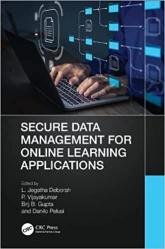Secure Data Management for Online Learning Applications
- Добавил: literator
- Дата: 16-02-2023, 05:31
- Комментариев: 0
 Название: Secure Data Management for Online Learning Applications
Название: Secure Data Management for Online Learning ApplicationsАвтор: L. Jegatha Deborah, P. Vijayakumar, Brij B. Gupta, Danilo Pelusi
Издательство: CRC Press
Год: 2023
Страниц: 299
Язык: английский
Формат: pdf (true)
Размер: 15.3 MB
With the increasing use of e-learning, technology has not only revolutionized the way businesses operate but has also impacted learning processes in the education sector. E-Learning is slowly replacing traditional methods of teaching and security in e-learning is an important issue in this educational context. With this book, you will be familiarized with the theoretical frameworks, technical methodologies, information security, and empirical research findings in the field to protect your computers and information from threats. Secure Data Management for Online Learning Applications will keep you interested and involved throughout.
Chapter 2: the Internet or the web is essential to the full operation of online learning techniques. Despite all the advantages the internet offers for uninterruptible learning, it is inescapably the source of all security risks. Online learning environments are hence more vulnerable to cyber-attacks. Numerous well-known video conferencing and online learning platforms, such as Moodle and Google Classroom, among others, all have their share of security risks. The various security risks, mostly from outside intruders, that could directly or indirectly influence online learning systems include virus threats, hacker risks, SQL injection risks, brute force risks, and denial of service risks. ARP cache poisoning, IP spoofing, stack-smashing attacks, session hijacking, cross- site request forgery (CSRF), masquerade, cross-site scripting (XSS), and MITM attacks are additional security dangers. This chapter on the numerous hazards or vulnerabilities associated with online learning may surprise e- learning companies as they install security measures.
Teachers face a lot of challenges when it comes to teaching programming languages because of the wide diversity in students’ background knowledge, fear of programming, and problems in learning syntax. The study discussed in the Chapter 5 focuses on novice learners who are learning a programming language for the first time at college level. When it comes to teaching a programming language to a class, the teacher has the task of addressing heterogeneous learners from different backgrounds. A majority of them could be novice learners, some with a passion for programming, some with a disinclination towards programming, and some who have already learned some programming languages. Focusing on each student’s individual needs is a difficult task when it comes to classroom teaching. Blended learning approaches are more effective in such cases. They help provide customized materials and attention to different types of students. When programming is taught online, teachers can check the code, and guide the learners through the virtualized platforms. Collaborative coding can also be developed through online platforms. Tools such as Raptor, can help students to grasp programming concepts faster. After getting trained in such tools, students may be given the task of learning a programming language along with syntax. Another alternate approach is to teach a programming language with light syntax such as Python initially and introduce other languages such as C, C++, and Java later.
Table of Contents:
1. Secure Online Assessment of Students using Optimized Deep Learning Technique
2. Survey of Risks and Threats in Online Learning Applications
3. Approaches to Overcome the Security Risks and Threats in Online Learning Application
4. Secure Data Aggregation and Sharing for online learning applications
5. A Secure Data-centric Approach on Blended Learning for Programming Languages
6. Centralized Key Distribution Protocol Using Identity-Based Encryption Techniques in Cloud Computing Environment
7. Efficient Key Management and Key Distribution for Online Learning
8. An efficient privacy preserving and public auditing data integrity verification protocol for cloud based online learning environment
9. A Novel Secure E-learning Model for Accurate Recommendations of Learning Objects
10. Efficient Key Management and Key Distribution Schemes for Online Learning
11. Improved online secure virtual learning using block chain Technology
12. A Robust Mutual and Batch Authentication Scheme based on ECC for Online Learning in industry 4.0
13. Sentiment analysis: The beginning
Скачать Secure Data Management for Online Learning Applications
[related-news] [/related-news]
Внимание
Уважаемый посетитель, Вы зашли на сайт как незарегистрированный пользователь.
Мы рекомендуем Вам зарегистрироваться либо войти на сайт под своим именем.
Уважаемый посетитель, Вы зашли на сайт как незарегистрированный пользователь.
Мы рекомендуем Вам зарегистрироваться либо войти на сайт под своим именем.
